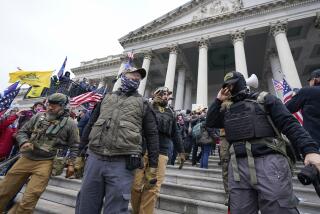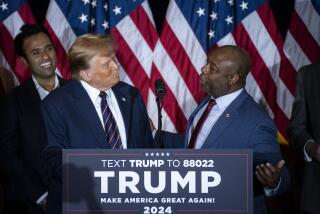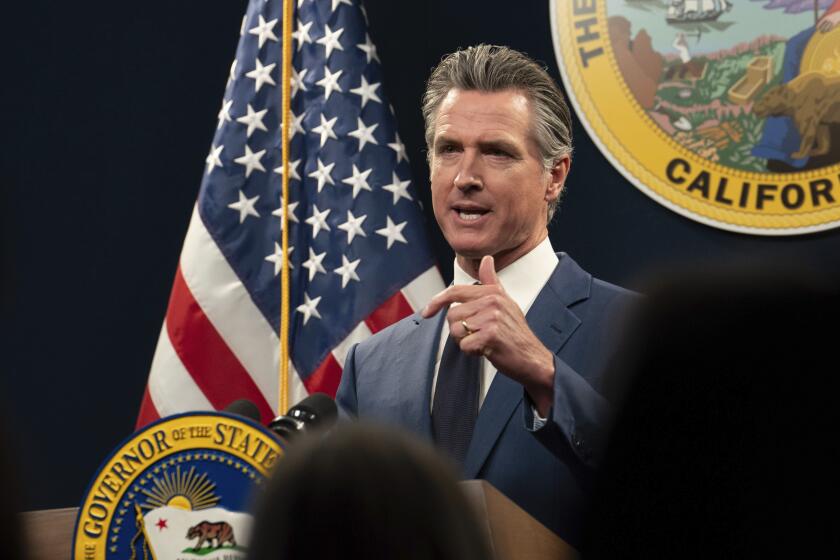From War Protester to Commander in Chief ? : Election: Lincoln and Bush are contrasting examples of why the draft is a non-issue.
Republicans are eager to contrast President Bush’s World War II military record with Bill Clinton’s purported lack of martial valor. Bush’s prior military experience, we are told, eminently qualifies him as a leader in times of war and diplomatic crisis, whereas Clinton would allegedly hesitate to send youths into combat just as he had avoided the draft during the Vietnam War.
Presumably anyone who “betrays” America in time of war and refuses the call to arms cannot possibly be a statesman of leadership capabilities and a military strategist prepared to use armed force as an instrument of politics. He is not to be trusted.
The example of Abraham Lincoln refutes such a claim. In 1847, Lincoln as a member of Congress adamantly opposed the maneuvers President Polk had been taking to precipitate a war with Mexico.
Unlike Theodore Roosevelt, Lincoln had no streak of bellicosity, and unlike Bush, he would not gloat over victory and boast of how he “kicked ass.” Lincoln made light of his service in the Black Hawk War of 1832. Later he said that the real war was not with Indians but mosquitoes. The only fighting Lincoln liked was wrestling.
In the case of the Mexican War, Lincoln knew that the President was lying and that the war was an unjust aggression to annex new territories and possibly to spread slavery into the Southwest. He paid a price for his opposition. One paper called him a modern Benedict Arnold; another accused him of having “spotted fever,” after Lincoln’s attempt to force the President to admit that Mexico had jurisdiction over the exact spot where blood had been shed in a border skirmish. The label “spotty Lincoln” stuck and boded ill for his political aspirations.
Despite his revulsion toward violence and his anti-war record in the Civil War, Lincoln went on to become the greatest commander in chief in American history. Lincoln could sense a mistake before it became a disaster, and he was willing to replace his military commanders as he continually defined the objectives of the war. Again and again he urged his generals to attack, and he privately reprimanded them for allowing Confederate armies to escape. The young congressman who had opposed the Mexican War had more fighting spirit than his generals.
Is there any connection between Bush’s military record and his conduct in foreign affairs? The invasion of Panama was as bungled as it was bloody, and in the Gulf War young American men and women were fighting against an enemy that Bush and his advisers had armed to the teeth. The war itself signified the failure of Bush’s assumption that Saddam Hussein would back down and pull out of Kuwait rather than risk a military confrontation and certain defeat. There seems to be no connection whatsoever between Bush the Navy aviator and Bush the President, whose statecraft suffers from systematic misjudgment.
The Bush campaign parades its candidate as a military hero, but his political career is spectacularly unheroic. Leaving aside domestic politics, Bush’s conduct in Cold War diplomacy hardly represents a profile in courage or conviction. For all the claims of the Republicans to having won the Cold War, Bush is hardly the person to take credit. At the moment of truth, when apparatchiks attempted a coup against Mikhail Gorbachev, Bush hesitated and waited to see which side would prevail. During the days of Tian An Men Square, Bush, Richard Nixon, Henry Kissinger and other “experts” sided with the butchers of Beijing, while Chinese students invoking Jefferson and Lincoln were massacred. The Republicans reasoned that Japan, and not China, would emerge as an expansionist threat and thus a U.S.-Chinese coalition must be nurtured. With this rationale, the Vietnam War must be judged the stupidest and most tragic war in American history, one for which there could be no Gettysburg Address explaining why 58,182 lives had not been lost in vain.
In betraying American ideals to power politics, Bush seems to believe “an evil empire” in one part of the world can become a land of economic opportunity and strategic defense in another. The Republican Party, led by its renowned military hero, has revised Lincoln’s “house-divided” biblical warning: A world can exist half-slave and half-free.
More to Read
Get the L.A. Times Politics newsletter
Deeply reported insights into legislation, politics and policy from Sacramento, Washington and beyond. In your inbox three times per week.
You may occasionally receive promotional content from the Los Angeles Times.






